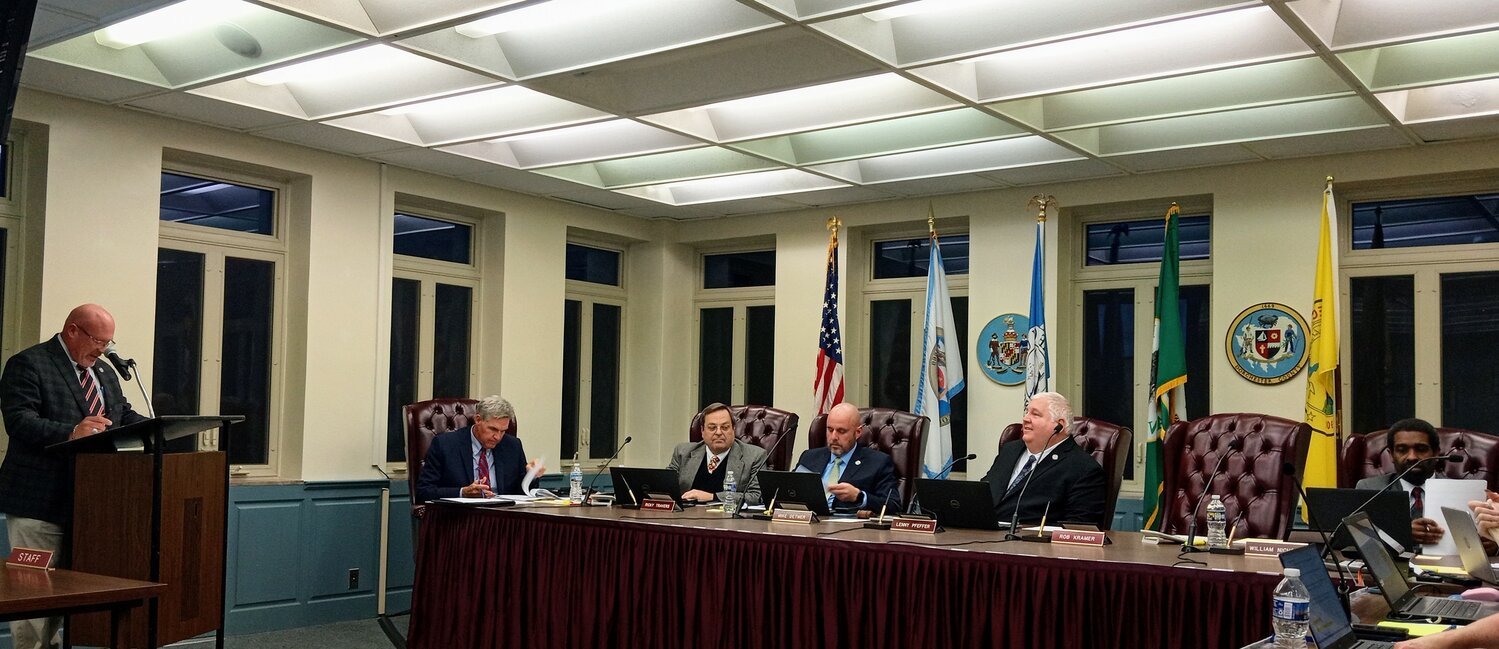Eight Changes Proposed to Dorchester County Charter
Dorchester County, one of nine Maryland counties operating under Charter Home Rule, may be set to place proposed changes to that charter on the November ballot.
First, Council members want to hear from the citizens they represent as soon as possible.
Charter Review Commission Chair William Layton presented the seven-member committee’s recommendations to Council during its regular bi- monthly Tuesday evening meeting on March 5 at the County Office Building.

You must be a member to read this story.
Join our family of readers for as little as $5 per month and support local, unbiased journalism.
Already a member? Log in to continue. Otherwise, follow the link below to join.
Please log in to continue |
Eight Changes Proposed to Dorchester County Charter
CAMBRIDGE - Dorchester County, one of nine Maryland counties operating under Charter Home Rule, may be set to place proposed changes to that charter on the November ballot.
First, Council members want to hear from the citizens they represent as soon as possible.
Charter Review Commission Chair William Layton presented the seven-member committee’s recommendations to Council during its regular bi- monthly Tuesday evening meeting on March 5 at the County Office Building.
“I thought I knew a lot about county government, but doing this has taught me so much over the past six months,” Layton commented.
The Commission's recommendations represented what members considered the most pressing items needing to be addressed, Layton said.
They would mark the first changes since the Charter was written and adopted in 2002.
Other Commission members included Vice Chair Allen Nelson, Glenn Bramble, Susan Dukes, Linda Henry, Robert Murphy, and George (Philip) Reed.
After hearing from Layton, Council agreed to quickly disseminate the recommendations on the County’s website and media outlets to help facilitate public comment at the next Council meeting on March 19.
A Town Hall to discuss those changes is also planned.
The following eight Charter changes were presented for consideration, along with reasons for their selection.
County Manager Responsibilities
Change requested:
Add language that would solidify the difference between responsibilities of the County Council and County Manager, emphasizing
●County Manager is the only one allowed to direct employees
●When position is vacant, search must start immediately
●If position is not filled timely, alternative search measures must be employed
●County Manager must be available full time
●County Manager cannot take direction from individual Council members without majority Council approval
●Only the County Manager can hire and fire county employees
County Manager Residency
Change requested:
●Change the requirements of the County Manager to remove the county residency requirement
While the Commission believed that relative residential proximity should be considered, this would allow Council to choose the most qualified person, overall. “Trappe, for instance, while not in Dorchester County, is even closer to Cambridge than some South Dorchester areas,” Layton said.
Administrative Review
Change requested:
●Change the Administrative Review to require it be done in the first fiscal year of each new Council
Director of Finance Residency
Change requested:
●Change the requirements of the County Director of Finance to remove the residency requirement
Budget Due Date
Change requested:
●Change the due date for the proposed County budget from May 1 to no later than May 15 of each year
The extra few weeks would help align Dorchester with other counties’ schedules and allow staff a crucial extra two weeks.
Budget Adoption
Change requested:
●Change the adoption date for the County budget from June 1st to no later than June 15th
Transparency
Change requested
●Add language to Section 606 to ensure transparency and ensure that the most effective means are used to disseminate meeting information
●Live streaming of Council meetings has been a great asset; added language would ensure that it continues.
Term Limits
Change requested:
●Add language to the County Charter to limit a County Council member to 3 four year terms (for a total of 12 years) beginning with the 2026 Council
Discussion surrounding this item was the most heated, with the committee continually evenly split for and against. In the end, the members decided to include it, in order to allow voters to decide the issue.
The issue also provoked the most comment from Council members.
Council President Pfeffer said that in his experience, there’s so much to learn about serving on the Council; the first term you’re learning so much, and only in the second term do you begin to apply that learning.
Pfeffer then asked why the members selected a three term limit. Layton replied that two seemed too few, and four too many. Pfeffer also questioned whether more than three total terms could be served if they were non consecutive, and Layton answered affirmatively.
Second District Councilman William Nichols voiced his strong opposition to any term limits, saying that doing so interfered with the people’s right to freely choose their representatives.
“To me, no Board should sit up and say you can't have him or her because they’ve been sitting there long. To me, a term limit is four years,” Nichols said.
“Dorchester and Cecil counties are two counties that will take you out in a minute. You’re taking the will of the people away. I don't believe in that. We shouldn't decide, they should,” Nichols said.
Commission member George (Phil) Reed, seated in the meeting room audience, responded, “Mr. Nichols, we all know how difficult it is for a new person to get elected when the incumbent’s status carries too much weight. You and I can agree to disagree.”
On behalf of the County Council, Pfeffer thanked the Commission members for doing their due diligence so well. “You really went over the Charter with a fine tooth comb,” he said.
District Three Councilman Ricky Travers agreed that they had done a great job.
Council Vice President Mike Detmer added his appreciation for the excellent quality and pace of working through what he knew were very difficult issues.
Detmer then asked Council Attorney Charles MacLeod about the most efficient way of getting public feedback in advance of finalizing the ballot language.
“You can look at this and do nothing for whatever reason or you can pick one or two, or come up with your own,” MacLeod advised. “You can have as many hearings as you want, but I recommend presenting all the recommended changes on the same night.”
MacLeod also mentioned that the Council might opt to act by changing local law and code instead of the Charter.
“State law gives you until the third Thursday in August to get questions ready to be reviewed for the ballot,” he said.
The ballot questions must be submitted in a format which can be answered ‘yes’ or ‘no’, which requires careful wordsmithing, MacLeod said.
“I see the pros and cons of each of these recommendations, so we should hear from people about all of them before we decide what to advance,” Detmer said.
“My main consideration is to not get so jammed up that we run out of time. That would be a huge disservice to the timely way the Committee worked and produced results,” he said.


 By
By 



